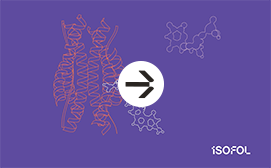The drug candidate that can enhance the effect of chemotherapy

Isofol develops the drug candidate arfolitixorin, designed to enhance the efficacy of today’s and future cancer treatments. By addressing a known treatment gap, the goal is to help more patients gain better conditions to respond to their treatment and hence achieve an improved prognosis.
Arfolitixorin has the potential to become a key component of today’s standard treatment for several forms of solid tumors. The drug candidate is now being investigated in a clinical phase Ib/II-study in patients with metastatic colorectal cancer.
Currently, 5-FU-based chemotherapy is given as standard first-line treatment usually together with folate therapies to enhance its effect in several aggressive cancers. These folate drugs are broken down in the body and converted into the active metabolite [6R]-MTHF, which increases the tumor-killing effect of 5-FU while reducing the production of one of the building blocks that tumor cells need to multiply. While existing folate therapies require multi-step metabolic conversion, arfolitixorin consists of the active metabolite in its pure form. Arfolitixorin, therefore, has the potential to act directly during treatment, which can bring significant benefits to patients.
Previous clinical studies have shown statistically significant results demonstrating that patients with colorectal cancer treated with arfolitixorin achieved three to four times higher concentrations of the active metabolite in tumor tissue compared with current folate therapies. When arfolitixorin was given together with 5-FU in the treatment of colorectal cancer, the tumor-killing effect was enhanced, resulting in increased cancer cell death.
The Evidence Platform supports continued development
Arfolitixorin has shown promising efficacy and safety results in previous studies, including the global phase III AGENT study. The study compared the effectiveness and safety of arfolitixorin with the current folate therapy, leucovorin. The results showed that arfolitixorin provided numerically comparable efficacy to leucovorin but did not demonstrate superior results. Subsequent analyses concluded that the study’s dosing regimen was suboptimal, which likely explains why no efficacy difference was observed. Recent preclinical research demonstrates that optimized dosing, involving higher doses administered in a modified sequence, has the potential to provide a better treatment results.
In preclinical studies, a clear dose-response relationship has been observed, meaning that the effect of arfolitixorin increases with higher doses. This is a unique feature of arfolitixorin and differs from current folate therapies, where increased doses do not result in greater efficacy.
Ongoing clinical phase Ib/II study
To demonstrate the clinical potential of arfolitixorin, Isofol is conducting a phase Ib/II clinical study to determine the optimal dosing regimen for safety, tolerability and efficacy. The study design was approved by the German Medicines Agency in March 2025. Recruitment of treatment-naive patients with metastatic colorectal cancer started in April 2025 at the leading academic hospital Charité – Universitätsmedizin Berlin.
The goal is to expand the study in phase II to include both additional study centers in Europe and patients in Japan in 2026 in collaboration with Isofol’s partner, Solasia Pharma K.K. In parallel, discussions are ongoing with the U.S. Food and Drug Administration (FDA).

Interview with Charité – Universitätsmedizin Berlin
Watch the interview with Prof. Sebastian Stintzing who is the principal coordinating investigator in Isofol’s on-going phase Ib/II study.
Last updated:
